
Global Love Report – July 9th, 2025
English summary by Margaret
To coincide with Japan’s annual Tanabata festival on July 7th, a celebration based on the folklore of distant lovers Orihime and Hikoboshi, matchmaking company IBJ Inc. surveyed the users of its Bridal Net platform, which has 1,609 active users. The study, managed by the IBJ Matching App Lab, explored the attitudes of modern singles toward long-distance relationships (LDRs), which are increasingly common in the context of modern work and lifestyle choices.
Experience with Long-Distance Relationships
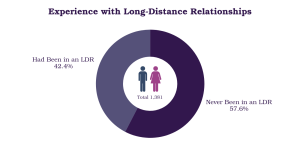

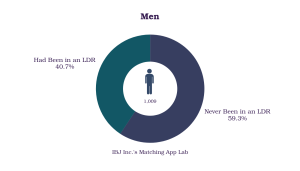
Among 1,381 respondents who answered whether they had been in a long-distance relationship, 42.4% said they had such experience. Women were slightly more likely to have been in LDRs, with 47% of 372 female respondents answering yes, compared to 40.7% of the 1,009 male participants.
Perceptions of Whether Long-Distance Relationships Can Work
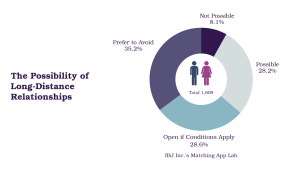
When asked about the overall feasibility of long-distance relationships, responses were divided but leaned toward cautious optimism. A combined 56.8% of all participants felt that LDRs are possible. Specifically, 28.2% said they believe such relationships are possible, while 28.6% were open to them if certain conditions, such as limited distance or duration, are met. Meanwhile, 35.2% said they would prefer to avoid LDRs if possible, and only a small portion, 8.1%, said they do not believe they can work at all.
Gender-Based Differences in Attitudes Toward LDRs
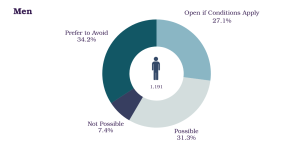
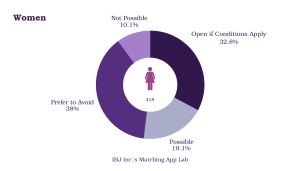
The survey revealed subtle differences between men’s and women’s perspectives. Among men, 31.3% believed long-distance relationships are possible, and 27.1% were open to them under specific conditions. However, 34.2% stated they would rather avoid them. In contrast, women tended to show greater caution. Only 19.1% expressed belief in LDRs without reservations, while 32.8% were open if the right conditions were in place. The largest portion, 38%, indicated they would avoid being in one if given the choice, suggesting a stronger preference for proximity and emotional consistency.
Reasons for Supporting Long-Distance Relationships
The most frequently cited reason for accepting long-distance relationships was the belief that “distance doesn’t matter if you love each other.” This response was common among both men and women. Additionally, female respondents commonly mentioned that LDRs provide more free time for personal activities, which was the second most cited reason among women and fifth among men.
Main Challenges in Sustaining LDRs
Participants also identified key challenges. For men, the inability to meet in person whenever desired emerged as a primary concern. For women, the financial strain, particularly travel expenses, was the top issue. One woman in her 40s shared that although the distance didn’t affect her emotionally, the cost of frequent two-hour commutes made it difficult to save for the future.
Keys to Making LDRs Last
Across both male and female respondents, the main factors contributing to successful long-distance relationships included maintaining frequent communication, setting clear expectations for how often to meet, and discussing future plans. Because regular in-person interaction is limited, many respondents pointed to the importance of maintaining emotional stability and a shared sense of security.
Originally published by: PR TIMES





